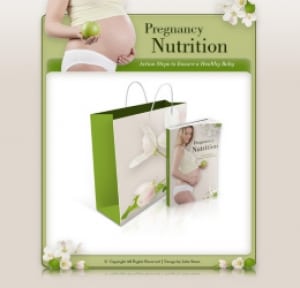
Children grow up too fast. Before too long the almost indistinguishable speck in your womb is going to be flying down a hill on a bike with their hands in the air and driving down the interstate in your new car. Before you know it you’ll be telling them good-bye as they start college, crossing your fingers and hoping for the best. You’ll never have the opportunity to nurture them again that you do right now, when they’re safely inside you tucked away from the outside world.
This is going to be the last time in your life that it’s a piece of cake to get them to eat their vegetables, so enjoy it! You’re going to spend the next eighteen years (and then some) trying to convince them that spinach is good for them and that the slimy stuff on the outside of their carrots is just pulp, but right now you’re making all the decisions when it comes to what they eat.
Proper pregnancy nutrition is a vital factor in proper fetal development because the fetus is physically incapable of providing for itself, nor can it show any visible signs of malnourishment between monthly check-ups as a newborn can. That means that for the next nine months it’s going to be completely up to you to ensure that you are properly eating for two, taking in the vitamins and nutrients that are going to help you give birth to a healthy, happy baby while keeping yourself healthy at the same time.
Remember, baby’s going to take what it needs long before those nutrients ever have the opportunity to go through your system. By not eating properly you’re not only harming your baby, you’re harming yourself as well. That’s why it’s so important that you make sure you get the vitamins and nutrients that you need for the next nine months as well. Lack of attention might still lead to a healthy baby, but baby’s not going to change themselves! Mom needs to be healthy too in order to keep up with her little bundle of joy in the coming months. Giving birth is hard enough on the body. You certainly don’t want to add malnutrition into the mix.
The problem that many women face when it comes to pregnancy nutrition is that they simply don’t understand. Why? Not because they’re stupid, or because they don’t want to do what’s best for their baby. It’s because most books on pregnancy, particularly those that deal with the ins and outs of nutrition for the next nine months, are written by medical professionals. That makes sense, right? Who better to take advice from concerning the growth and development of your baby than the doctor that’s made it their life’s work?
Most moms aren’t doctors, however, and that’s where the trouble comes in. It’s all well and good to sit down and look at a chart that shows how much of each mineral you’re supposed to take in on a daily basis over the next nine months, but if you don’t understand what you’re reading and the effect it’s going to have on your baby then it isn’t going to do you a whole lot of good. You’re going to spend a month, maybe two, looking at the labels on the back of your food. Then you’re going to get sick of it and go back to your old eating habits, reasoning that you’ve always been healthy. You’re taking your prenatal vitamins. What could go wrong?
This book was written with “Dr. Mom” rather than “Dr. Smith” in mind. Throughout the coming sections you’ll find a thorough breakdown of the nutrients you need to ensure that you deliver a healthy baby when the time comes and basic guidelines for the trimester-by-trimester dietary changes you’re going to have to make, all written in every day, ordinary English rather than medical-ese.
What’s that mean? It means you don’t have to go out and buy a medical dictionary to understand what you’re about to read! Even if you can’t follow an ordinary, “recommended” pregnancy diet (which tends to get old after the first trimester) you can still give your little bundle of joy a “best odds” chance at making a great start in life.
Happy Reading!
Do You Want To Know More?
